-
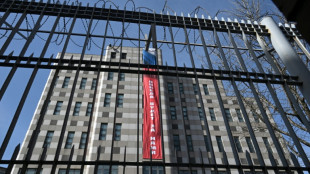 South Korea protests 'Victory' banner hung from Russian embassy
South Korea protests 'Victory' banner hung from Russian embassy
-
Asian stocks rally after Trump's Supreme Court tariffs blow
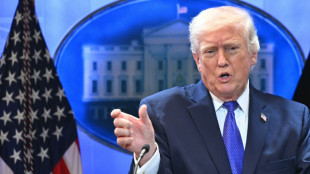
-
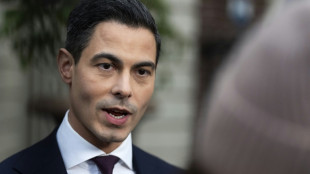 New Dutch government to be sworn in under centrist Jetten
New Dutch government to be sworn in under centrist Jetten
-
New York mayor orders citywide travel ban as major storm hits US

-
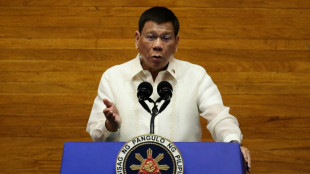 ICC to begin pre-trial hearing for Philippines' Duterte
ICC to begin pre-trial hearing for Philippines' Duterte
-
After two convictions, France's Sarkozy seeks to merge sentences
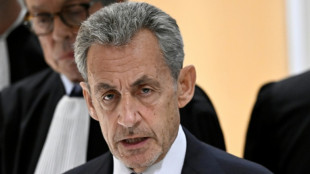
-
 Bridgeman hangs on to claim first PGA Tour title at Riviera
Bridgeman hangs on to claim first PGA Tour title at Riviera
-
Hong Kong appeals court to rule on jailed democracy campaigners
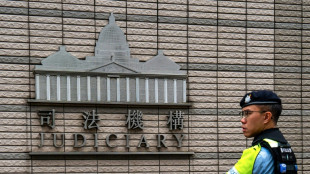
-
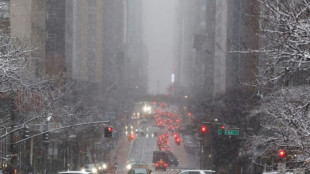 Blizzard blows New Yorkers' plans off course
Blizzard blows New Yorkers' plans off course
-
More than 200 political prisoners in Venezuela launch hunger strike
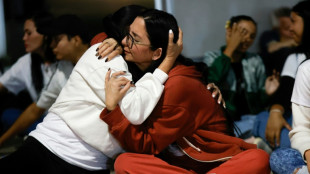
-
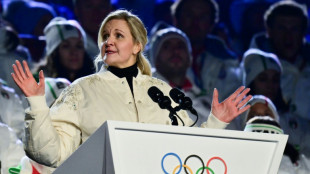 Milan-Cortina hailed as 'new kind' of Winter Olympics at closing ceremony
Milan-Cortina hailed as 'new kind' of Winter Olympics at closing ceremony
-
Thunder strike from long range to halt Cavs' seven-game win streak

-
 Strasbourg snap Lyon winning run in Ligue 1
Strasbourg snap Lyon winning run in Ligue 1
-
Top Mexican drug cartel leader killed
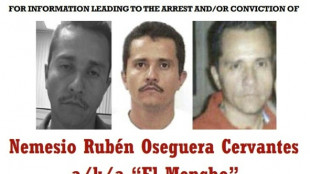
-
 'One Battle' triumphs at BAFTAs that honour British talent
'One Battle' triumphs at BAFTAs that honour British talent
-
New Nissan Leaf 2026 review

-
 Giroud penalty ends Lille's winless run in Ligue 1
Giroud penalty ends Lille's winless run in Ligue 1
-
Thrashing Spurs dragged Arsenal out of title hell: Arteta

-
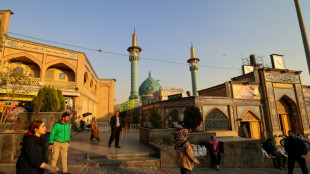 Iran-US talks expected Thursday despite fears of strikes
Iran-US talks expected Thursday despite fears of strikes
-
Milan beaten by Parma, Napoli rage at officials

-
 Hughes looses teeth then scores Olympic gold-winning goal for USA
Hughes looses teeth then scores Olympic gold-winning goal for USA
-
Eze and Gyokeres destroy Spurs to boost Arsenal title bid

-
 Arsenal's Eze sinks Spurs again, Liverpool late show floors Forest
Arsenal's Eze sinks Spurs again, Liverpool late show floors Forest
-
Galthie praises France lock Meafou and defence

-
 'Nothing was good', says Mac Allister despite Liverpool win
'Nothing was good', says Mac Allister despite Liverpool win
-
USA defeat Canada for Olympic men's ice hockey gold, Trump celebrates

-
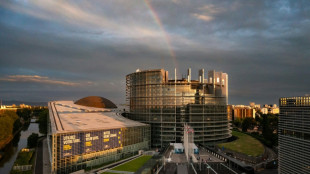 EU 'expects' US to honour trade deal as Trump hikes tariffs
EU 'expects' US to honour trade deal as Trump hikes tariffs
-
'GOAT' battles to top of N. America box office

-
 South Africa thrash India to end 12-match T20 World Cup win streak
South Africa thrash India to end 12-match T20 World Cup win streak
-
Bielle-Biarrey breaks record as France beat Italy in Six Nations

-
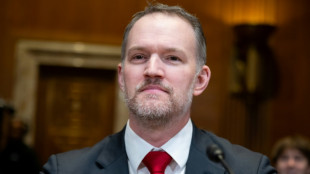 US says trade deals in force despite court ruling on tariffs
US says trade deals in force despite court ruling on tariffs
-
Barcelona back top of La Liga with Levante win

-
 Gu strikes gold, USA beat Canada in men's ice hockey
Gu strikes gold, USA beat Canada in men's ice hockey
-
What's behind England's Six Nations slump?

-
 Napoli rage at officials after loss at Atalanta
Napoli rage at officials after loss at Atalanta
-
Liverpool late show floors Nottingham Forest

-
 Rimac Nevera R: Beyond imagination
Rimac Nevera R: Beyond imagination
-
USA beat Canada to win men's Olympic ice hockey gold

-
 Samardzic seals comeback win for Atalanta over Napoli
Samardzic seals comeback win for Atalanta over Napoli
-
Eileen Gu switches slopes for catwalk after Olympic flourish

-
 Luce: Ferrari's ingenious electric revolution
Luce: Ferrari's ingenious electric revolution
-
Miller guides South Africa to 187-7 against India

-
 Scotland boss 'proud' of comeback Six Nations win over Wales
Scotland boss 'proud' of comeback Six Nations win over Wales
-
Iranian students rally for second day as fears of war with US mount

-
 US Secret Service kills man trying to access Trump Florida estate
US Secret Service kills man trying to access Trump Florida estate
-
Coventry 'let the Games do their magic': former IOC executives

-
 Cayenne Turbo Electric 2026
Cayenne Turbo Electric 2026
-
Sri Lanka have to qualify 'the hard way' after England drubbing

-
 Doris says Six Nations rout of England is sparking Irish 'belief'
Doris says Six Nations rout of England is sparking Irish 'belief'
-
Thousands of pilgrims visit remains of St Francis

Israel’s Haredi Challenge
The ultra‑Orthodox, or Haredi, community in Israel has become the focus of intense national debate. When the state was founded in 1948, a small number of exceptional Torah scholars were allowed to devote themselves to study instead of serving in the military. Nearly eight decades later, the people who follow this stringent interpretation of Judaism make up almost one in seven Israelis. Their numbers are growing rapidly, their political parties wield outsized influence in coalition politics, and their educational and economic choices increasingly shape the country’s future. As Israel grapples with war in Gaza, coalition infighting and a fragile economy, many secular and modern‑orthodox Israelis view the Haredi sector as the most formidable challenge to national cohesion and prosperity.
A population boom and its consequences
Demography is the most visible driver of change. Haredi families typically marry young and have large households: fertility rates average more than six children per woman, compared with about three across Israeli society. As a result, the community’s population has doubled in just fifteen years and now exceeds 1.3 million people. Demographers project that, by the start of the next decade, they will make up around one sixth of Israel’s citizens, and that their share of the 25‑29 age cohort will rise from 13 per cent in 2025 to 28 per cent by 2060. Around sixty per cent of Haredim are under the age of twenty. This youthful, rapidly expanding population concentrates in high‑density neighbourhoods in Jerusalem and Bnei Brak, placing intense pressure on housing, schools and local services.
Education and the labour market
Most ultra‑Orthodox boys’ schools devote the bulk of the day to religious studies and neglect secular subjects such as mathematics, English and science. The government provides funding to schools that pledge to teach a “core curriculum”, but enforcement is weak and many Haredi schools either ignore or water down these subjects. Policy analysts argue that this educational deficit locks many Haredi men out of higher education and skilled employment.
In the labour market, a gender divide has emerged. Haredi women, who often shoulder the financial burden while their husbands study, have made significant strides; about four fifths participate in the workforce. In contrast, employment among ultra‑Orthodox men has stalled at just over half, compared with around 85 per cent among other Israeli men. Many rely on stipends for yeshiva students and generous child allowances, reinforcing the incentive to remain outside the labour force. An OECD survey issued in April 2025 notes that budgetary support for yeshivas was increased significantly in recent years, deepening men’s disincentives to seek work. The same report stresses that reallocating funding toward schools that teach the full curriculum and conditioning childcare support on both parents’ employment could help narrow labour‑market gaps.
The result of low male employment is acute economic disparity. Ultra‑Orthodox households tend to earn roughly two thirds of the income of non‑Haredi households and depend more heavily on public benefits. With the community’s share of the population rising steadily, these gaps threaten to undermine Israel’s fiscal base and widen social divisions.
The conscription crisis
Israel’s defence doctrine rests on the principle of universal national service. Yet tens of thousands of Haredi men receive de facto exemptions because they are enrolled in religious seminaries. In June 2024, the country’s Supreme Court declared that, in the absence of a specific law distinguishing yeshiva students from other citizens, the defence service statute applies to them like anyone else. The justices decried the previous system as selective enforcement and a violation of equality, especially during wartime.
The ruling has proved difficult to implement. Despite an urgent demand for additional combat troops in 2025, only a tiny fraction of eligible ultra‑Orthodox men have presented themselves at induction centres. Estimates suggest that fewer than five per cent responded to call‑up notices and barely one per cent were actually inducted. Many secular and modern‑orthodox Israelis, who have spent long stints on the front lines since October 2023, are angered by what they see as an unfair distribution of sacrifice. Ultra‑Orthodox leaders argue that Torah study is a form of national service and insist that conscription would erode their religious way of life. They cite fears of exposure to secular influences, mixed‑gender environments and the weakening of rabbinic authority.
Protests and political turmoil
The dispute over military service has triggered some of the largest demonstrations in Israeli history. On 30 October 2025, hundreds of thousands of Haredi men converged on Jerusalem in a “million‑man march” to demand that yeshiva students remain exempt. The protest shut down highways and public transport, drew thousands of police officers and resulted in the death of a teenager who fell from a building. Banners proclaimed, “The people are with the Torah,” and speakers accused the government of betraying Judaism. The rally followed arrests of students who ignored draft notices.
These events have destabilised the governing coalition. Ultra‑Orthodox parties hold roughly 18 of the Knesset’s 120 seats, making them indispensable partners for Prime Minister Benjamin Netanyahu. In July 2025 the United Torah Judaism party walked out of the government over the failure to pass a draft‑exemption law, and the Shas party resigned from its cabinet posts while continuing to vote with the coalition. Both insisted that they would not return until the status of yeshiva students was secured.
In early November 2025 Netanyahu sought to break the impasse by advancing a conscription bill drawn up by Knesset Foreign Affairs and Defence Committee chair Boaz Bismuth. The proposal aims to enlist fifty per cent of each annual ultra‑Orthodox draft cohort within five years. Critics, including opposition leader Yair Lapid, denounce it as a draft‑evasion bill riddled with loopholes. It lowers the threshold for yeshiva students to qualify for exemptions and softens penalties; draft evaders would be allowed to travel abroad after age 26, and licence suspensions would be scrapped. Supporters argue that codifying a realistic target will stabilise the coalition and bring ultra‑Orthodox parties back into government. As of mid‑November, the bill’s fate remains uncertain, and any perceived capitulation could provoke further protests or even bring down the government.
Gender segregation and the public sphere
Beyond conscription and economics, the ultra‑Orthodox exert growing influence on daily life. Although Israel’s Supreme Court outlawed gender‑segregated public buses in 2011, incidents persist. In 2023 a bus driver ordered teenage girls to cover their bodies and sit at the back, asserting that the route was a religious line; the case ended in a legal settlement in 2025. Advocacy groups recorded dozens of complaints of gender exclusion on public transport that year.
At the legislative level, coalition lawmakers have promoted initiatives that critics say blur the separation between religion and state. In October 2025 ministers proposed a bill requiring every public institution to affix a mezuzah and granting broad protections for religious rituals. Under the measure, interfering with Orthodox practices would become a criminal offence, and gender‑segregated prayer could be permitted if it reflected the worshippers’ tradition. Supporters framed the bill as protecting Jewish heritage; opponents warned that it would turn public spaces into ultra‑Orthodox domains and infringe upon democratic norms. Although some of the most controversial provisions were later removed, the episode underscored fears among secular Israelis that their society is being remoulded according to Haredi standards.
Change from within
The Haredi world is not uniform, and signs of change are visible. A survey published in October 2025 by researchers from the Hebrew University found that while the community retains conservative values, economic necessity has driven increasing acceptance of employment and professional education, particularly for women. Respondents described a “bounded pragmatism”: they adapt behaviour without renouncing ideology. Core religious studies and male higher education remain sensitive boundaries, but many respondents expressed openness to new national Haredi political frameworks. Opposition to mandatory military service was widespread and couched in moral terms.
Another social shift involves those leaving the ultra‑Orthodox fold. A study by the organisation Out for Change in 2025 found that growing numbers of former Haredim remain religiously observant in varying degrees and maintain ties to their families. Contrary to stereotypes, departure from the community does not always entail a complete break with faith; for many it is a move towards a hybrid identity that balances tradition and modernity.
Paths to integration
Addressing the ultra‑Orthodox challenge requires a multi‑layered approach. First, education policy must ensure that schools receiving state funds teach the full core curriculum; enforcement of funding conditions should be robust. Universities and vocational colleges can develop programmes tailored to ultra‑Orthodox students, offering separate campuses or hours to accommodate cultural norms. Financial incentives, such as earned‑income tax credits, should encourage men to seek employment rather than rely on stipends.
Second, conscription policy needs to balance equality with respect for religious sensibilities. Creative solutions could include expanded civil‑service tracks, specialised military units that protect religious observance, or alternative service in healthcare and education. The goal should be to share the defence burden more equitably while acknowledging the community’s fears.
Third, coalition politics should not treat public funds as bargaining chips. Transparent budgets, clear criteria for subsidies and accountability for yeshivas would reassure taxpayers that funds are being used responsibly. Dialogue between government ministers, army officials and rabbinic leaders is essential to design policies that are both just and workable.
Finally, a pluralistic public sphere must be safeguarded. Laws should protect freedom of religion without imposing religious norms on unwilling citizens. Resolving disputes over gender segregation, Sabbath observance and kosher certification will require compromise and a renewed commitment to democratic principles.
Conclusion
Israel’s ultra‑Orthodox community poses a unique challenge because its demographic momentum intersects with issues of economy, defence, politics and culture. The community’s deep commitment to tradition, combined with its growing size and political leverage, tests the country’s ability to remain both Jewish and democratic. Navigating this challenge will demand a delicate balance of enforcement and accommodation: enforcing equal obligations and educational standards while accommodating religious identity and autonomy. If Israel can foster integration without coercion and encourage responsibility without alienation, the Haredi challenge could become an opportunity to strengthen social cohesion and economic vitality.

Trump's threats to Colombia

COSTCO profits from Fees

AI bust: Layoffs & Rent surge

Trap laid, Ukraine walked in

BRICS-Dollar challenge

Saudi shift shakes Israel

Al-Qaida’s growing ambitions

Argentina's radical Shift

Hidden Cartel crisis in USA

New York’s lost Luster

Europe’s power shock



